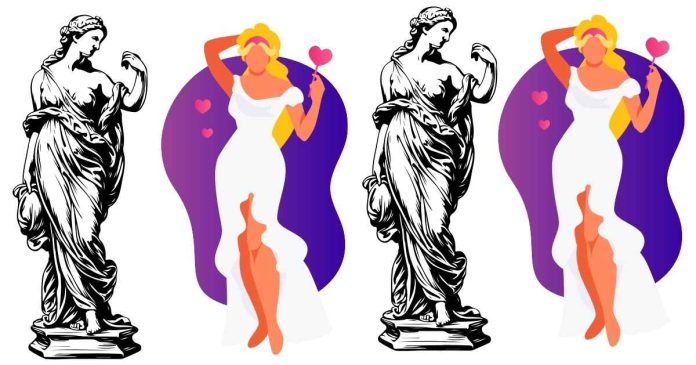In ancient Greek mythology, there are several gods and deities associated with love, desire, and passion. While Aphrodite is the most famous, other figures also embody aspects of love in its various forms. Here’s an overview:
Major Gods and Deities of Love
- Aphrodite
- Role: Goddess of love, beauty, and desire.
- Significance: Aphrodite is the primary deity of romantic and physical love. Her myths often involve her affairs and influence over mortals and gods alike.
- Eros
- Role: God of desire and erotic love.
- Significance: Often depicted as Aphrodite’s son, Eros wields a bow and arrows that cause people to fall in love. In later myths, he is portrayed as the playful, mischievous Cupid.
- Himeros
- Role: God of sexual desire.
- Significance: Usually associated with the immediate lust or passion that follows love. Himeros is said to accompany Aphrodite when she arises from the sea.
- Anteros
- Role: God of reciprocal love.
- Significance: Anteros represents love returned and often contrasts unrequited love. He is also considered a counterpart to Eros.
- Pothos
- Role: God of longing and yearning.
- Significance: Pothos personifies the deep desire for something unattainable or distant, often tied to romantic or spiritual longing.
Other Deities with Connections to Love
- Peitho
- Role: Goddess of persuasion and seduction.
- Significance: Often associated with Aphrodite, Peitho embodies charm and the art of convincing others, particularly in romantic contexts.
- Hebe
- Role: Goddess of youth and marital love.
- Significance: As the wife of Heracles, Hebe represents the youthful aspects of love and the joy of marriage.
- Charites (Graces)
- Role: Goddesses of charm, beauty, and goodwill.
- Significance: The three Charites—Aglaea, Euphrosyne, and Thalia—are often depicted alongside Aphrodite, spreading love, joy, and beauty.
- Nyx (in her aspect as Philotes)
- Role: Primordial goddess associated with affection and friendship.
- Significance: In some accounts, Philotes represents love in a more platonic and friendly sense.
Primordial and Cosmic Connections
- Gaia and Uranus
- As primordial entities, they symbolize the union of Earth and Sky, a foundational love that birthed the gods.
- Harmonia
- Role: Goddess of harmony and unity.
- Significance: While not directly a goddess of love, she represents the peaceful and harmonious aspects of relationships.
Greek mythology offers a rich tapestry of love-related figures, each representing different dimensions of this complex emotion—from romantic and physical love to longing, persuasion, and reciprocity. Together, they illustrate the diverse ways love influenced ancient Greek culture and storytelling.


